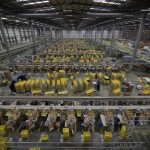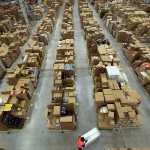13 Secrets of Amazon Warehouse Employees

In 2014, Amazon sold two billion items worldwide. All those products, from phone cases to car seats, are stored inside Amazon’s fulfillment centers and then sorted and wrapped by warehouse workers. In the U.S. alone there are more than 50 of these gigantic buildings with 40,000 workers toiling away inside them, and that’s not counting the tens of thousands of part-time workers who join during busy seasons.
These are the people who make sure your package, no matter how big or small, gets to your doorstep. We spoke to a few of these employees about what it’s like to be part of the Amazon machine.
1. Not everyone has a horror story

Getty Images
There have been dozens of stories portraying Amazon warehouses as inhumane, hellish workplaces, and while some workers may have been subject to these conditions, the ones I spoke to hadn’t. “It is certainly hard work,” said Brant Ivey, who spent six months in one of Amazon’s hubs lifting oversized objects. But “the conditions at the warehouse were on par or better than most other warehouses that I have been in.” One of the biggest complaints is that the warehouses are too hot. In 2012, after a lengthy expose revealed brutally hot summertime conditions, Amazon announced plans to spend $52 million to install air conditioning in its U.S. warehouses.
One Reddit user put it bluntly: “The work does suck, but all warehouse work sucks. I have experienced FAR worse conditions and been treated terrible by other Fortune 500 companies.”
2. They leave everything at the door
Amazon workers aren’t allowed to bring anything with them to the warehouse floor, including cell phones. They arrive empty-handed and leave empty-handed. “If you brought in your phone and you weren’t management, security would confiscate it and at end of night you had to go to security to pick it up,” says Charlee Mided, who worked in a warehouse in Phoenix, Arizona in 2013. “Then you’d get home late. So everyone knows not to do it.”
3. They hate the metal detectors
As an added layer of security, workers are subject to airport-style security checkpoints each time they leave the floor, including lunch break. According to Mided, when the lunch buzzer rings, there’s a mad rush to avoid the lines. “If you’re way over on one side of the warehouse and lunch is called, you have 30 minutes from that point to clock out, eat, and come back. You’re spending half your time waiting to be scanned out so you can be sure you’re not stealing anything. It leaves you with about 10 minutes for food.” The same lines form at the end of the day when workers pour out of the building. And workers don’t get paid to stand in line, thanks to a Supreme Court decision at the end of 2014 that ruled businesses like Amazon don’t have to pay employees for the time they spend waiting to be scanned.
4. They have strict quotas

Getty Images
Workers who pull items from shelves to fulfill your orders are known as “pickers,” and they are monitored for their speed and accuracy. “My only job was to grab two large, yellow plastic bins, put them on my double decker shopping cart, and fill them with the items that my scanner told me to find,” a former picker said during a Reddit AMA.
“At my peak, I was picking 120+ items per hour, and it was just good enough.”
5. And they walk. A lot.
Amazon fulfillment centers are colossal. One warehouse in Baltimore covers one million square feet, or roughly 23 acres. That’s a lot of land to cover on foot. One employee, who worked in Amazon warehouses for 14 years, told us he walked 13 miles a day when picking. “That’s over a 10 hour period, so its like 1.3 miles per hour, which isn’t bad,” he says. “But doing it for 10 hours straight, by the third or fourth day your legs are almost like jelly.”
6. The shelves are chaos
When items arrive at the warehouse, they’re scanned and placed in cubby holes on one of hundreds of rows of shelves. But there’s no rhyme or reason to where they’re stored, and even seasoned warehouse employees can’t make sense of it. “Each cubby hole is filled with an assortment of items,” according to a former worker.
“There might be a book, a toothbrush, a copy of a Barbie VHS tape from 1993, and a pair of moccasins. And you’ll only pick one of the items.” There’s a term for this: chaotic storage.
Amazon’s database knows where there’s empty shelf space and fills it as quickly as possible to maximize efficiency. Electronic scanners tell workers where to find the items they’re looking for. Video shows shelving chaos:
7. They have to do group exercises
“Every night, twice a night, when we showed up and when we came back from lunch we had to do calisthenics,” says Mided. “Jumping jacks, reacharounds, swinging our arms. It limbers you up and it really is helpful for the job, but it’s just… it kinda makes you feel like you’re five.”
8. And bubble wrap is their entertainment
Mided says occasionally the machine that distributed bubble wrap at her warehouse cut too much, but workers didn’t mind. “They’d be like, ‘Oh look! Bubble wrap!’ You’d see people just sitting around popping bubble wrap. Everyone wanted to be on bubble wrap detail.” Amazon workers: They’re just like us!
9. The warehouse cafeteria is a war zone
Workers have two lunch options: Bring your own, or buy a meal from one of dozens of vending machines stocked with mediocre microwavable meals like burgers and hot dogs. “You’d buy a hamburger and it didn’t taste like real beef,” one former worker told us. And good luck heating up your food. Mided’s warehouse cafeteria had about 20 microwaves, and the fight for zap time was fierce. “It was a war zone trying to get enough time to heat your food and then get out without being run over,” she says. “You would see people fight. The smartest thing to do was to pack something that doesn’t need microwaving, because that was killer.”
10. The warehouses have their own nurse’s office
“It’s very much like a school nurse’s office,” says Mided. “You sit down, they tell you to ice this or that. You tell them on a scale of one to 10 which face matches your pain. They really can’t treat you much. They can give you ice and aspirin, that’s about it.”
11. And fakers get put on broom duty

Getty Images
“A lot of people would make up stuff just to get off the floor,” a former worker says. “Some people would just confuse being tired with being hurt. They’d say, ‘My legs hurt!’ No, you’ve just been walking around forever.” If the nurse can’t find anything wrong with you but you insist you’re unwell, the supervisors will find an easy job for you to do that doesn’t require any heavy lifting. More often than not, this means broom duty. “That’s only good for the first hour,” Mided says. “Twelve hours of pushing a broom is the most mind-numbing thing on the planet. But that still doesn’t prevent people from faking.”
12. “Problem solver” is a warehouse job
It’s their responsibility to fix other people’s mistakes. If a warehouse packer screws up on the assembly line, the Amazon machine knows it. Scales weigh each package, and if the weight is off, the box gets pulled and a “problem solver” is called over to inspect it. “If there is an error during any stage of the process, I find it, correct it, and provide the feedback to the person or cause of the error,” explains one problem solver in a recent Reddit AMA.
13. They see some crazy orders
If there’s one thing all Amazon warehouse workers will tell you, it’s that people order some weird things. “The amount of stand-up life-size Justin Biebers I saw was unnecessary,” Mided says. “And a lot more sex toys than you would think. Really odd ones. Even grown men or women warehouse workers are still kinda like a 12-year-old when they see that. Amazon really does sell everything.”
Sourced from mentalfloss






























13 Secrets of Amazon Warehouse Employees